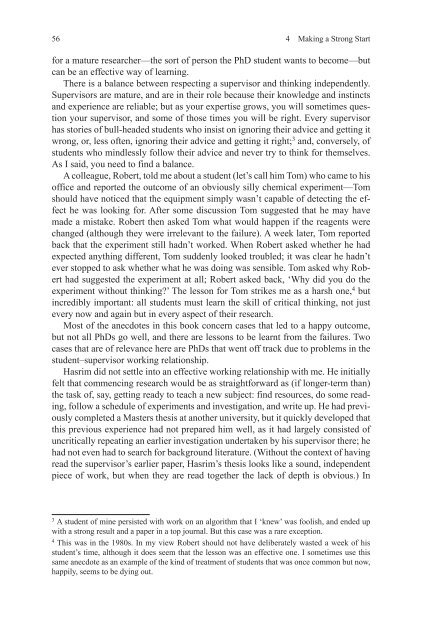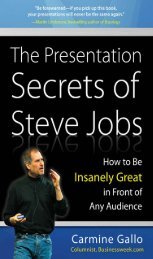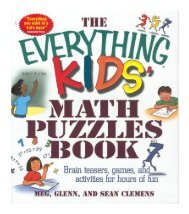How-to-Write-a-Better-Thesis
Create successful ePaper yourself
Turn your PDF publications into a flip-book with our unique Google optimized e-Paper software.
56 4 Making a Strong Start<br />
for a mature researcher—the sort of person the PhD student wants <strong>to</strong> become—but<br />
can be an effective way of learning.<br />
There is a balance between respecting a supervisor and thinking independently.<br />
Supervisors are mature, and are in their role because their knowledge and instincts<br />
and experience are reliable; but as your expertise grows, you will sometimes question<br />
your supervisor, and some of those times you will be right. Every supervisor<br />
has s<strong>to</strong>ries of bull-headed students who insist on ignoring their advice and getting it<br />
wrong, or, less often, ignoring their advice and getting it right; 3 and, conversely, of<br />
students who mindlessly follow their advice and never try <strong>to</strong> think for themselves.<br />
As I said, you need <strong>to</strong> find a balance.<br />
A colleague, Robert, <strong>to</strong>ld me about a student (let’s call him Tom) who came <strong>to</strong> his<br />
office and reported the outcome of an obviously silly chemical experiment—Tom<br />
should have noticed that the equipment simply wasn’t capable of detecting the effect<br />
he was looking for. After some discussion Tom suggested that he may have<br />
made a mistake. Robert then asked Tom what would happen if the reagents were<br />
changed (although they were irrelevant <strong>to</strong> the failure). A week later, Tom reported<br />
back that the experiment still hadn’t worked. When Robert asked whether he had<br />
expected anything different, Tom suddenly looked troubled; it was clear he hadn’t<br />
ever s<strong>to</strong>pped <strong>to</strong> ask whether what he was doing was sensible. Tom asked why Robert<br />
had suggested the experiment at all; Robert asked back, ‘Why did you do the<br />
experiment without thinking?’ The lesson for Tom strikes me as a harsh one, 4 but<br />
incredibly important: all students must learn the skill of critical thinking, not just<br />
every now and again but in every aspect of their research.<br />
Most of the anecdotes in this book concern cases that led <strong>to</strong> a happy outcome,<br />
but not all PhDs go well, and there are lessons <strong>to</strong> be learnt from the failures. Two<br />
cases that are of relevance here are PhDs that went off track due <strong>to</strong> problems in the<br />
student–supervisor working relationship.<br />
Hasrim did not settle in<strong>to</strong> an effective working relationship with me. He initially<br />
felt that commencing research would be as straightforward as (if longer-term than)<br />
the task of, say, getting ready <strong>to</strong> teach a new subject: find resources, do some reading,<br />
follow a schedule of experiments and investigation, and write up. He had previously<br />
completed a Masters thesis at another university, but it quickly developed that<br />
this previous experience had not prepared him well, as it had largely consisted of<br />
uncritically repeating an earlier investigation undertaken by his supervisor there; he<br />
had not even had <strong>to</strong> search for background literature. (Without the context of having<br />
read the supervisor’s earlier paper, Hasrim’s thesis looks like a sound, independent<br />
piece of work, but when they are read <strong>to</strong>gether the lack of depth is obvious.) In<br />
3<br />
A student of mine persisted with work on an algorithm that I ‘knew’ was foolish, and ended up<br />
with a strong result and a paper in a <strong>to</strong>p journal. But this case was a rare exception.<br />
4<br />
This was in the 1980s. In my view Robert should not have deliberately wasted a week of his<br />
student’s time, although it does seem that the lesson was an effective one. I sometimes use this<br />
same anecdote as an example of the kind of treatment of students that was once common but now,<br />
happily, seems <strong>to</strong> be dying out.














![[Lonely Planet] Sri Lanka](https://img.yumpu.com/59845622/1/169x260/lonely-planet-sri-lanka.jpg?quality=85)


